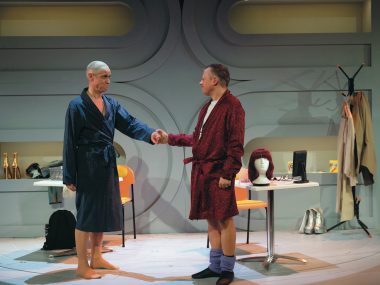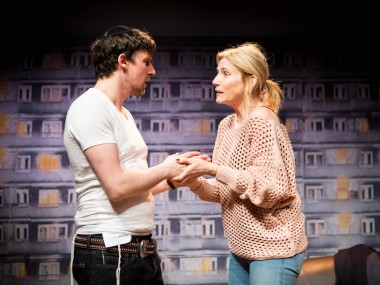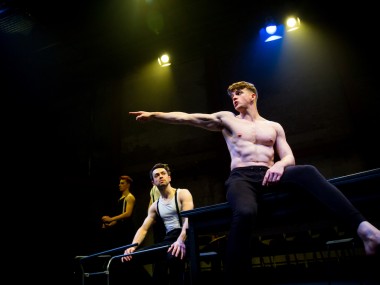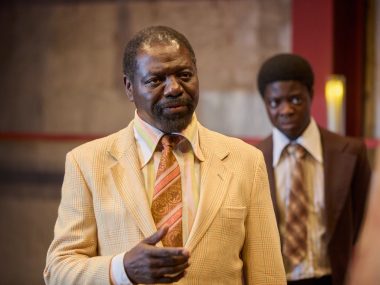Candy, Park Theatre
Tuesday 29th August 2023
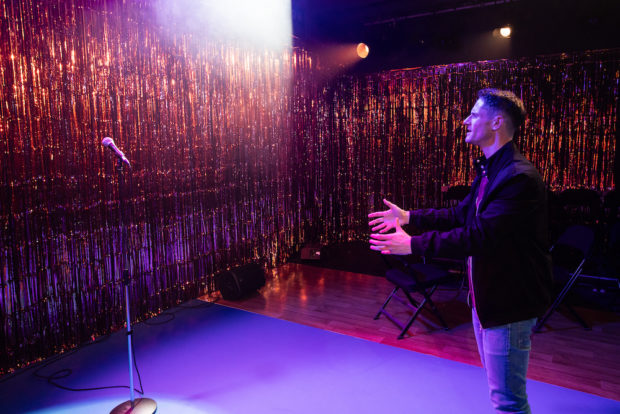
Okay, let’s start with a quick definition: it is said that sex is what you have between your legs, and gender is what you have between your ears. Certainly, the emotional experience of falling in love is a mixture of both physical and psychological desires, affected by both individual personality and the wider culture. In Tim Fraser’s debut play, his 70-minute monologue Candy, which was staged in earlier versions at the King’s Head Theatre and the Edinburgh Fringe Festival, and now arrives at north London’s Park Theatre, these issues are explored in a story that is both a comedy and a moving account of gender confusion and masculine identity.
The plot is about Will, a straight single working-class man who lives in the North-East of England, and who has traditional views about masculinity. He lives with his mum and an ageing aunt who he calls Toadface, works at a car insurance company with a sympathetic boss called Deborah, and likes to hang out with the lads, drinking and joking. When alone, he enjoys playing video shoot ’em ups. He doesn’t believe in love at first sight, and laughs at the notion that Romeo immediately fell for Juliet without having talked to her about “what kind of music” she likes, until — of course — Cupid sends a love-tipped arrow his way.
It happens at a local gig where Billy, his childhood friend from school, is performing with his band. Grumbling about the cost of attending the event, which at £5 is hardly the price of a Taylor Swift concert, Will is struck by a thunderbolt when the band’s sultry singer, called Candy, appears on stage. She is beautiful, sexy and alluring. She is also, Will instantly understands, his old friend Billy in drag. For someone who hasn’t often had to analyze his own emotions, this leads to a spiral of confusion as he grapples with the new emotions of overwhelming love and desire, feelings which destabilize his daily life.
Not only does Fraser’s psychologically coherent text present a convincing picture of gender fluidity, but his character Will is firmly situated within the context of contemporary society, with its Tinder temptations and DVDs of rom-coms. While his mum and Toadface sink in their armchairs and watch classic 1990s romantic comedies starring Hugh Grant and Julia Roberts, Will’s infatuation spins off into a subjective inferno — which reminds me of William Hazlitt’s Liber Amoris (1823), his memoir of his embarrassing infatuation with his landlord’s daughter — that results in problems at work and suicidal urges.
What is brilliantly conveyed is the utterly interior feeling of falling passionately in love with a beauty, who is never approached but always admired at a distance. Will not only dreams about Candy, her silky voice and her young body, but is sexually aroused both by the fantasy of her being a real woman and the fantasy of having sex with a man. This puts in question his traditional ideas of masculinity, which are articulated here by his mates who typically think that men in drag are “just a laugh”. To be mocked. But the most excruciating moment comes when Will finally sums up the courage to tell Billy how he feels.
Although this monologue is short, it still does a good job in complicating, and challenging, the traditional gender binary of male/female (man/woman), showing how personal identity can be both, even if this causes mental anguish. It also shows that the realization of unexpected desire can happen suddenly, and that anyone can discover that the world of new feelings, especially previously unimagined sexual desire, at any time of their lives. The play has a queer sensibility in that it powerfully interrogates the notion that gender is just a case of either/or, when the reality is much less simplistic.
Stories of unrequited love always have to show the enormous gap between subjective feeling and objective reality, and Fraser does this with clarity and precision. He also simply and beautifully shows the confusion of desires and how gender fluidity might be experienced by an “ordinary bloke”, taking also into account how young people often scorn their parents and older relatives, without realizing that the lives of old people can include youthful experiences that are as emotionally strong as their own. That old woman in the armchair was once a stunning young dancer.
Michael Waller’s performance has a heartfelt sincerity, as he mixes wry humour with deep longing and unsettling urges, in a compelling portrait of gender twists. He clearly switches between his Will persona and those of the other characters, such as Billy, Candy and Deborah, with a warm and often amusing rapport with the audience in Park Theatre’s studio space. The evening is well directed by Nico Rao Pimparé in a cabaret setting designed by Alys Whitehead, Jonathan Chan (lighting) and Anna Short (sound), which includes pub tables and a glitter ball for the gig scenes. The ambience is helped by Stephen Waller’s music, which suggests the cool of the night club and the swirling hormones of lust. The result is a moving account of loneliness and self-love.
This review first appeared on The Theatre Times

